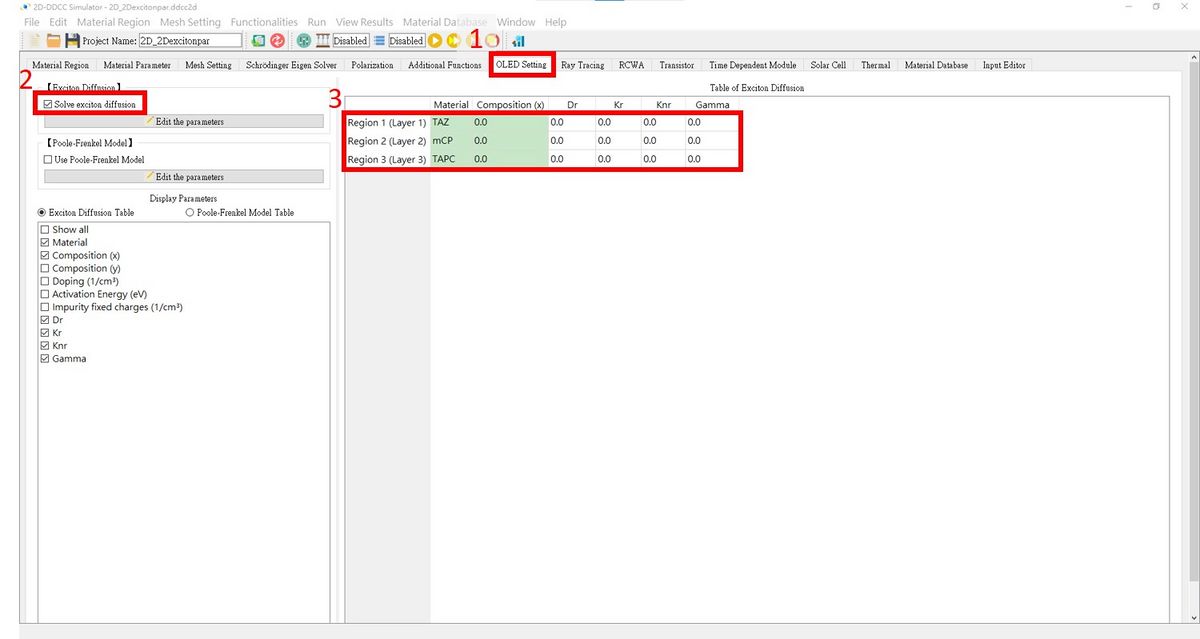"$2Dexcitonpar" 修訂間的差異
出自 DDCC TCAD TOOL Manual
| (未顯示由 2 位使用者於中間所作的 5 次修訂) | |||
| 行 13: | 行 13: | ||
excitonpar(1,n) excitonpar(2,n) excitonpar(3,n) excitonpar(4,n) excitonpar(5,n) ... excitonpar(N_column,n) |
excitonpar(1,n) excitonpar(2,n) excitonpar(3,n) excitonpar(4,n) excitonpar(5,n) ... excitonpar(N_column,n) |
||
| ⚫ | |||
| + | At 10/01/2024: par 1-6 are defined as <br> |
||
| + | excitonpar(1,n) -> D_ex -> diffusion coefficient |
||
| + | excitonpar(2,n) -> Kr -> exciton radiative recombination |
||
| + | excitonpar(3,n) -> Knr -> exciton non-radiative recombination |
||
| + | excitonpar(4,n) -> <math> \gamma </math> -> exciton exciton quench |
||
| + | excitonpar(5,n) -> K_SE -> exciton - electron quench |
||
| + | excitonpar(6,n) -> K_SH -> exciton - hole quench |
||
| + | |||
| + | For example: |
||
| + | $2Dexcitonpar |
||
| + | 6 |
||
| + | 1.0e-7 1.0e7 3.0e7 1.0e-10 1.0e-5 2.0e-5 |
||
| + | 1.0e-7 1.0e7 3.0e7 1.0e-10 1.0e-5 2.0e-5 |
||
| + | 1.0e-7 1.0e7 3.0e7 1.0e-10 1.0e-5 2.0e-5 |
||
| + | .... N region need to have N layers |
||
| + | |||
| + | The summary of each loss will be outputted to the sum.json file |
||
| + | |||
| ⚫ | |||
<br>'''<big><big>The $2Dexcitonpar setting in GUI interface is here</big></big>''' <br> |
<br>'''<big><big>The $2Dexcitonpar setting in GUI interface is here</big></big>''' <br> |
||
| − | After setting up the general structure, press '''OLED Setting''' |
+ | After setting up the general structure, press '''OLED Setting''', check the box, and fill in the fields for '''Dr''', '''Kr''', '''Knr''', and '''Gamma''' as needed!<br> |
[[檔案:2D_2Dexcitonpar_fig1.jpg|1200px]] |
[[檔案:2D_2Dexcitonpar_fig1.jpg|1200px]] |
||
| + | |||
Related commands: <br> |
Related commands: <br> |
||
於 2024年9月28日 (六) 22:27 的最新修訂
$2Dexcitonpar is the command to solve the exciton diffusion equations. Actually the exciton solver is an external function which is developing. Therefore, there is no clear definition of exiciton parameters. user can define his won definition of these parameters. The format is
$2Dexcitonpar N_column excitonpar(1,1) excitonpar(2,1) excitonpar(3,1) excitonpar(4,1) excitonpar(5,1) ... excitonpar(N_column,1) excitonpar(1,2) excitonpar(2,2) excitonpar(3,2) excitonpar(4,2) excitonpar(5,2) ... excitonpar(N_column,2) excitonpar(1,3) excitonpar(2,3) excitonpar(3,3) excitonpar(4,3) excitonpar(5,3) ... excitonpar(N_column,3) excitonpar(1,4) excitonpar(2,4) excitonpar(3,4) excitonpar(4,4) excitonpar(5,4) ... excitonpar(N_column,4) ... ... ... ... excitonpar(1,n) excitonpar(2,n) excitonpar(3,n) excitonpar(4,n) excitonpar(5,n) ... excitonpar(N_column,n)
At 10/01/2024: par 1-6 are defined as
excitonpar(1,n) -> D_ex -> diffusion coefficient excitonpar(2,n) -> Kr -> exciton radiative recombination excitonpar(3,n) -> Knr -> exciton non-radiative recombination excitonpar(4,n) ->-> exciton exciton quench excitonpar(5,n) -> K_SE -> exciton - electron quench excitonpar(6,n) -> K_SH -> exciton - hole quench
For example:
$2Dexcitonpar 6 1.0e-7 1.0e7 3.0e7 1.0e-10 1.0e-5 2.0e-5 1.0e-7 1.0e7 3.0e7 1.0e-10 1.0e-5 2.0e-5 1.0e-7 1.0e7 3.0e7 1.0e-10 1.0e-5 2.0e-5 .... N region need to have N layers
The summary of each loss will be outputted to the sum.json file
The user will use these parameters in subroutine exciton2Dquench( ).
The $2Dexcitonpar setting in GUI interface is here
After setting up the general structure, press OLED Setting, check the box, and fill in the fields for Dr, Kr, Knr, and Gamma as needed!

Related commands:
$call2Dexciton